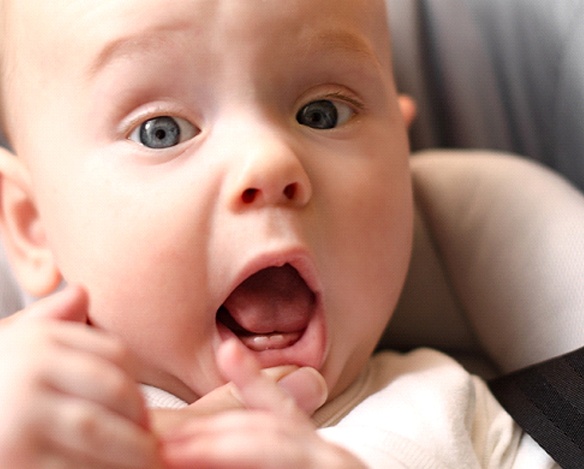Teething – COPPELL, TX
Teething
Having a teething baby is likely to leave you feeling tired, unhappy, and helpless. Watching your child cry because of the pain caused by tooth eruption is never easy. Between the late nights spent rocking them to sleep to the cold teethers to soothe their aching gums, you hope it will be over soon but long to find the right solution to help your baby. As a pediatric dentist, Dr. Rozas understands this feeling all too well. With children of her own, she, too, knows how it feels to be in your shoes. Fortunately, she and Dr. Compton are here to provide helpful tips and tricks to ensure you and your baby move through this phase as swiftly as possible. If you could use some advice to help your little one who's teething from our pediatric dentist, contact our dental office to schedule an appointment today.
The Teething Process

You may not realize this but when your child is born, they already have all 20 baby teeth. Although they cannot be seen, they are just sitting beneath the gum line, waiting to erupt. While you’re busy enjoying your baby’s gummy smile these first few months, you can expect around the age of 6 months for the first tooth to push through. This timeframe is different for all children, as some may not see their first tooth until closer to 12 months. No matter when it chooses to make its appearance, you can trust that you’ll know it.
Not only will your baby become irritable and fussy, but they’ll likely begin to drool excessively and show disinterest in eating.
The harsh reality for most parents is that the teething process is a continuous process that doesn’t typically end until your child is 3 years old. This is when you can expect them to have all their primary teeth.
Signs Your Baby is Teething

Not all babies exhibit the same symptoms when it comes to teething. In fact, some infants do not seem to be bothered much at all when their tiny teeth push through. But if you notice that your child is showing one or more of the following signs, it’s time to get ready for a new tooth to erupt:
- Fussiness
- Irritability
- Difficulty sleeping
- Excessive drooling
- Loss of appetite
- Biting hands and fingers to relieve pain
- Facial rash
There is the possibility that your little one may have an elevated temperature during this time; however, should it rise to more than 102 degrees Fahrenheit, you’ll want to get your child in to see their pediatric physician.
How You Can Help Your Child

Knowing what to do to help your little one through this difficult process can take some trial and error. However, there are some tried-and-true tips and tricks that work for most teething babies. By bringing your little one in to see Dr. Rozas, she and our team can go over the following information as well as discuss how you can begin to take care of these new teeth as they erupt:
- Place rubber teethers in the refrigerator to keep them cold. The cooler temperature will help to temporarily numb their gums and provide much-needed relief.
- Use a clean finger or damp washcloth to rub and gently massage their gums.
- Provide solid teethers for your child to chew on. Avoid those filled with liquid, as they can break or leak.
- Allow them to eat soft, pureed foods if they’re old enough. Make sure these do not contain sugar, as this can lead to cavities.
- Do not provide your child with benzocaine, which is commonly found in oral ointments. This is known for being toxic for infants.












